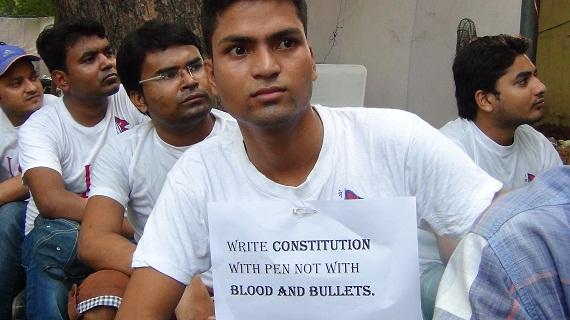HEADLINE
Economic Blockade will continue until demands are met, vow Nepal’s ethnic Madhesi
"Ethnic Madhesi protestors angry about the new constitution in Nepal say they won’t stop until their demands are met. "

The situation at the border of India and Nepal remains tense with an economic blockade under way.
Ethnic Madhesi protestors angry about the new constitution in Nepal say they won’t stop until their demands are met.
As Bismillah Geelani reports, the protests are putting pressure on governments both sides of the border.
Sanjeev Kumar is a 22-year-old student from the Tarai region of Nepal. He grew up like any other child in Nepal, attending a Nepali school and playing traditional Nepalese games after class.
But at the age of 10, an incident brought him face to face with another reality after Bollywood actor Hritik Roshan visited Nepal and was cheated by some local Nepalese.
“When he came back to India he said in an interview that Nepali people are not good. This infuriated the hill people and they attacked us,” explains Kumar, “They were saying Indians don’t like us and Madheshi’s are also Indians. This was the first time that I heard the word Madheshi.”
Kumar’s childhood dream was to become a doctor. But he believes his Madhesi identity made it impossible for him to realize it.
Unable to pay for his education, he pinned his hope on a government scholarship but says he was denied because the selection process discriminates against Madhesis.
Kumar then decided to head to Kathmandu to try his luck at becoming an accountant, but again his Madhesi origins saw him taunted by his classmates.
“They would often gang up and call me names, pull my hair and extort money from me. Sometimes they would call me in the night and threaten to kill me,” he recalls, “I was worried and complained to the teachers about this but they said, ‘Take it easy, you are friends’”.
Madhesis live in the southern plans of Nepal, which border India, and are of Indian origin. According to the 2011 Census, the ethnic groups accounts for 30 percent of Nepal’s population. But Madhesi groups contest the figure, saying the real number is much higher.
For decades, Madhesis have accused political elites from the highlands – who dominate the country’s politic – of mistreatment and discrimination.
Activist Sanjeev Yadav says the situation keeps Madhesis out of government and the public service.
“We have a 30 percent quota in government jobs but even in areas where we are in majority the jobs go to the hill people who come to live there,” he says.
At most government offices, says Yadav, there are barely three percent of Madhesi employees.
For the past decade Madhesi people have fought for their rights, and after violent, sometimes fatal clashes, the Nepali government finally promised the Madhesi would be given a fair deal in the new constitution.
But the process took 8 years and when the constitution was unveiled last month – most of their demands were not met.
Prashant Jha, an associate editor of the daily Hindustan Times, who has been covering the events, says the Madhesis got a raw deal.
“In the Tarai region, there is a general feeling among people, across party lines, across social groups, that the constitution has done a grave injustice justice to them,” he says
Proportionate representation in parliament, the creation of a larger autonomous Madhesh province, and an easing of citizenship norms, were some of the demands not met.
Debate and protests over the constitution have claimed the lives of more than 50 people in the last two months. Now as a pressure tactic, the protesters have now struck Nepal where it hurts.
For the past three weeks, the protesters have blocked the trade route on the Indian border – obstructing the supply of goods and fuel into Nepal.
Madhesi activist Yadav says the economic blockade was prompted by the Nepali authorities crossing the limit.
“The Nepali police urinated on the dead bodies of the protesters,” he says, “When there was no other way left we resorted to this blockade because unless we put pressure on Kathmandu in a way that is effective they are not going to listen.”
Nepal depends heavily on supplies from India and the blockade has led to an acute shortage of fuel and basic goods.
Some Nepalese blame India for the blockade, while the Nepali government has taken the matter to the United Nations.
While India has expressed its disapproval of Nepal’s constitution – citing neglect of Madheshi rights – it denies any involvement in the blockade.
“There’s no official or unofficial blockade by India on Nepal,” says Vikas Swarup, a spokesperson for India’s Foreign Ministry, “We too want the resolution of Nepal’s current problems but the solution has to come from within Nepal after consultation with their own people.”
Nepal’s New Prime Minister Khadga Prasad Sharma Oli has said they are ready to make changes to the constitution to accommodate the Madhesis.
But after two rounds of talks with the protest leaders there have not been any breakthroughs.
For now, the protestors say they won’t budge before any concrete agreement is reached.
- eng
- Bismillah Geelani
- Madhesi Ethnic
- Economic Blockade
- India Nepal Border
Komentar (0)
KBR percaya pembaca situs ini adalah orang-orang yang cerdas dan terpelajar. Karena itu mari kita gunakan kata-kata yang santun di dalam kolom komentar ini. Kalimat yang sopan, menjauhi prasangka SARA (suku, agama, ras dan antargolongan), pasti akan lebih didengar. Yuk, kita praktikkan!